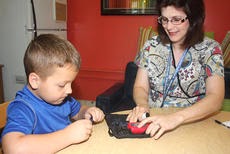School nurses are an unfunded mandate for schools, which are picking up more of their cost as health department budgets shrink

 |
| Marion County nurse Renee Schooling helps Levi Hardin, a Marion County first grader with diabetes, check his blood sugar. (Lebanon Enterprise Photo by Stevie Lowery) |
Kentucky school nurses are stretched thin across the districts they serve and the budgets to pay for them are stretched even thinner, because of budget cuts in the state Department of Public Health.
School districts are picking up the load, but often not all of it, because of their own financial challenges. “Basically it’s one of the many unfunded mandates,” Editor Stevie Lowery writes for The Lebanon Enterprise.
Lowery reports that the Marion County Schools currently share the cost of nurses with the Lincoln Trail District Health Department, with the schools paying 58 percent, or $161,000 a yera, and the department paying 42 percent, $116,000.
In some counties, schools are bearing the entire cost, which in some cases has reduced the availability of nurses, but Thursday night, the Christian County school board voted to hire another nurse, giving it one at every school, Editor Eli Pace reports for the Kentucky New Era in Hopkinsville.
Marion County Supt. Taylora Schlosser told Lowery that while her district values the services nurses provide, she and the school board will need to keep evaluating who pays for that service. The district plans to compare the cost of its contract with the health department and the cost of hiring its own nurses, with a commitment to not allow the level of service to change, Lowery reports.
“We
will always have school nurses because we are going to take care of our
kids,” Schlosser told Lowery. “How we pay for school nurses might change.”
In Kentucky, if a student requires medical care in order to attend school, state law requires school districts to provide the care. Districts may hire nurses, contract with the health department, or use the medical supervision and delegation of medical tasks to district staff by local medical professionals, Lowery reports.
School nurses take care of students and staff who are injured or not feeling well, care for students with special medical or dietary needs, administer medications, conduct screenings, give flu shots, provide nutrition and wellness education, certify and give immunizations, and train staff in CPR, first aid and emergency administration of medication, Lowery reports.
“We’re not just boo-boos and Band-Aids,” Keown told Lowery. “Our main goal is to keep kids in school and keep them healthy so they can get a better education. Healthy kids make healthy students.” (Read more)
In Christian County, nurses have been called on almost 13,000 times this year, nurse coordinator Megan Kidd reported to the school board Thursday night. She said many students in the district don’t have primary-care physicians and are told by their parents to see the school nurse, Pace reports.
“Kidd said
11 out of the district’s 15 schools have at least one diabetic student
who depends on insulin,” Pace writes. “In addition to insulin injections, other common
reasons for trips to the nurse include allergic reactions requiring
EpiPens and asthma attacks. Seizures also seem to be on the rise, Kidd
said.
“But even though most of the visits were related to fairly
common issues, Kidd told a story of a school nurse who once saw a
student starting to show signs of leukemia. The nurse didn’t diagnose
the child with cancer — that’s something a school nurse would be not
allowed to do anyway, Kidd said — but the nurse pushed the child’s
parents to go to the doctor, and the child did in fact turn out to have
cancer.” (Read more; subscription required)